How WHO and KSrelief helped 7-month-old Samer recover from malnutrition
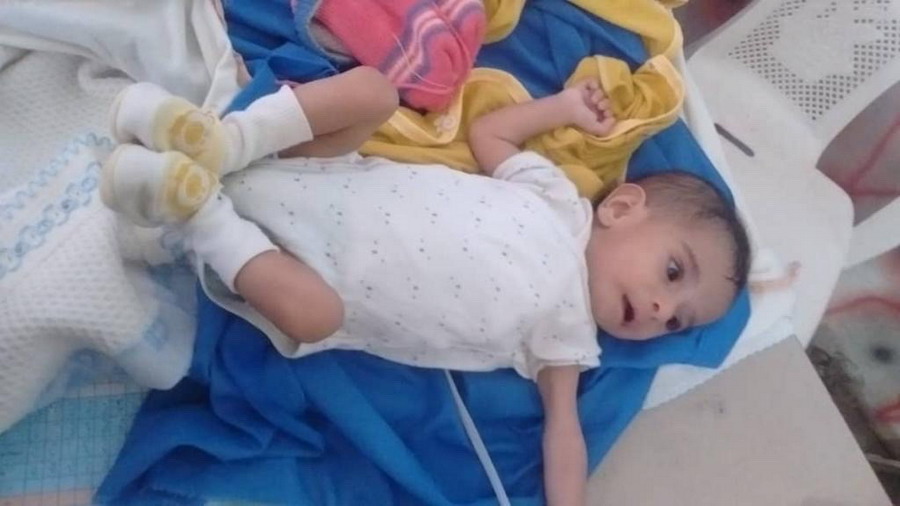 Samer weighed only 3.3 kgs with a 10.9 cm mid upper arm circumference and suffered from medical complications. Thanks to the treatment and nutritional food he had received at Al-Modhafar therapeutic feeding centre supported by WHO and KSrelief, he recovered, and his appetite eventually improved. Photo: Humanitarian Aid and Development Organization
Samer weighed only 3.3 kgs with a 10.9 cm mid upper arm circumference and suffered from medical complications. Thanks to the treatment and nutritional food he had received at Al-Modhafar therapeutic feeding centre supported by WHO and KSrelief, he recovered, and his appetite eventually improved. Photo: Humanitarian Aid and Development Organization
30 March 2021 – In Yemen, child malnutrition is of great concern riven by the conflict and its economic impact, including high rates of diarrhoea, respiratory infections, cholera, and rising food insecurity rates.
Samer Abdulwadood was born 7 months ago in Salh district, Taizz governorate, where his low-income family temporarily settled up to flee the region's ongoing fighting.
Samer's father managed to find a job as a motorcycle transporter, bringing people from one place to another. But he could barely provide a living for the family.
Without the daily nutritional intake necessary to maintain him in good health, Samer ended up suffering from severe acute malnutrition with medical complications.
Half of the children under the age of 5 (2.3 million) in Yemen are projected to suffer from acute malnutrition in 2021, of whom 400 000 are expected to suffer from severe acute malnutrition and could die if they do not receive urgent treatment.
The figures mark an increase in acute malnutrition and severe acute malnutrition, including with medical complications of 16% and 22%, respectively, among children under-5 years from 2020.
Within this context, the World Health Organization (WHO) and the King Salman Humanitarian Aid and Relief Centre (KSrelief) are continuing their joint fight against child malnutrition in Yemen by sustaining essential nutrition services and enhancing access to life-saving interventions for the most vulnerable populations.
Samer's 20-year-old mother is a housewife. She was desperate about her son's severe condition.
"Seeing him so feeble, without being able to help him made me feel useless," she said.
To detect malnutrition cases among children under-5 years of age, WHO has set up a nationwide nutrition surveillance system, a network of sites located in areas with the highest burden of malnutrition, to enable health workers to find, refer and treat these children.
Samer was screened for malnutrition by community health workers deployed by the Humanitarian Aid and Development Organization's (HAD) therapeutic feeding programme in the nearby Al-Modhafar district supported by WHO and KSrelief. He weighed only 3.3 kgs with a middle upper arm circumference of 10.9 cm and suffered from medical complications.
Samer was then transferred to the district's therapeutic feeding centre.
"He was in a critical condition and needed immediate attention to recover," said Dr Mahmoud, Nutrition Officer at the Al-Modhafar therapeutic feeding cemtre.
But recovering from malnutrition can take weeks. To encourage the mothers to stay at the nutrition ward, HAD provides them with food, hygiene kits and transportation allowance. The programme also includes infant and young child feeding sessions to avoid any future relapse or deterioration.
With the support of KSrelief, WHO supports 90 therapeutic feeding centres across 20 governorates in Yemen. This joint effort has helped to cure 7614 severely malnourished children since September 2020.
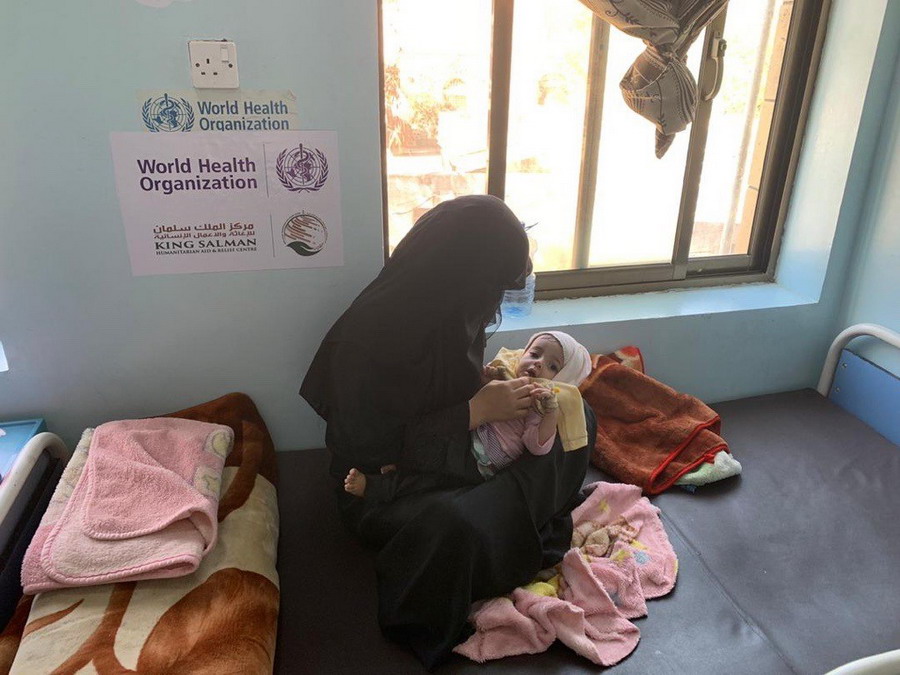 Recovering from malnutrition can take weeks. To encourage the mothers to stay at the nutrition ward, HAD provides them with food, hygiene kits and transportation allowance. Photo: HAD
Recovering from malnutrition can take weeks. To encourage the mothers to stay at the nutrition ward, HAD provides them with food, hygiene kits and transportation allowance. Photo: HAD
Thanks to the treatment and nutritional food he had received, Samer recovered, and his appetite eventually improved. The medical team decided to refer him to the nearest supplementary feeding centre to finalize the treatment cycle. Thirty days later, he was referred to the Blanket Supplementary Feeding Programme to ensure he would not suffer again from malnutrition.
"The project raised my awareness of how to take care of my children safely," said Samer's mother, who was sensitized about the importance of taking care of her children's cleanliness and choosing the right diet for them.
"After seeing the positive impact of this programme on Samer, my relatives and neighbours also brought their children for malnutrition screening and treatment," she added.
Emergency Health and Nutrition Project continues the fight against cholera in Yemen
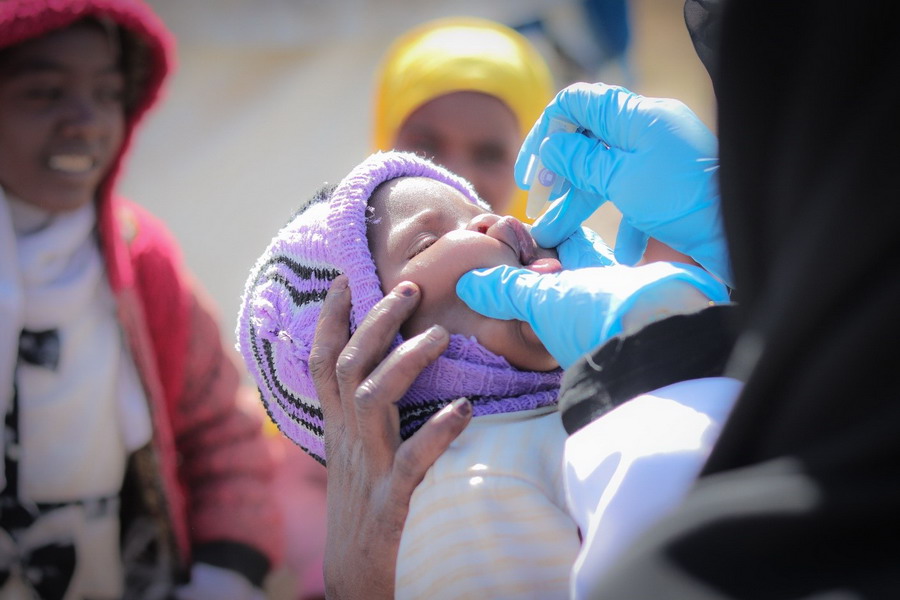 A child receives an oral cholera vaccine during the campaign. Photo: WHO
A child receives an oral cholera vaccine during the campaign. Photo: WHO
15 March 2021 – Yemen's conflict has resulted in a large-scale public health crisis, with a spiral of epidemic-prone infectious diseases, including the worst cholera outbreak ever recorded, with over 2.5 million suspected cases since October 2016. In 2020, a total of 230 540 suspected cholera cases and 84 associated deaths were reported nationwide. Areas that lack access to clean water and proper sanitation conditions are the worst hit.
WHO and health partners have been supporting health authorities to respond to this ongoing cholera outbreak. The response has included case management, surveillance and laboratory diagnostic capacity, hotspot mapping and oral cholera vaccine (OCV) campaign planning and implementation, water, sanitation and hygiene (WASH) support, and risk communication.
As part of this effort, in December 2020 and February 2021, WHO, in cooperation with UNICEF and the World Bank through the Emergency Health and Nutrition Project, supported the Ministry of Public Health and Population in conducting an oral cholera vaccination campaign in Hajr district in Hadramaut governorate and Al Dhalea and Al Azareq districts in Al Dhalea governorate.
As many people in these rural districts face difficulties in reaching health care centres, the campaign has assigned fixed and mobile teams to cover over 32 000 households and over 188 000 people in the 2 governorates.
"Because of the continuing conflict and COVID-19 consequences, access of the Yemeni people to basic health services remains a major concern. We have to proactively reach out to the population in need, including those in camps for the internally displaced," said Dr Adham Ismail, WHO Representative in Yemen.
As of 10 March 2021, Yemen's health authorities reported 2590 confirmed cases of COVID-19, with 655 associated deaths, but health partners remain concerned that under-reporting may be continuing in some areas of the country due to many reasons, including lack of testing facilities and delays in seeking treatment. The pandemic has further worsened the population's access to, and utilization of, health services.
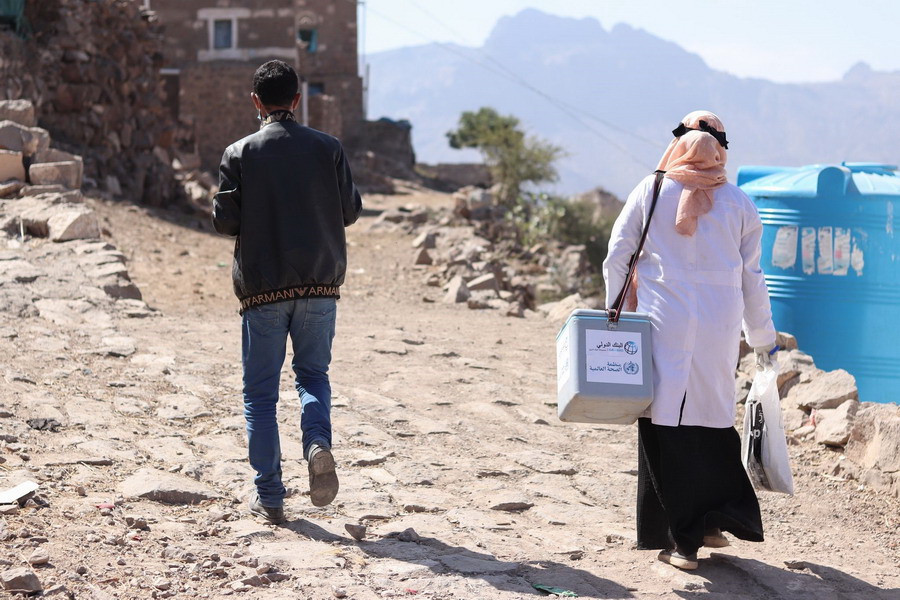 A total of 215 vaccination teams were mobilized to reach over 32 000 households and over 188 000 people in the governorates. Photo: WHO
A total of 215 vaccination teams were mobilized to reach over 32 000 households and over 188 000 people in the governorates. Photo: WHO
Nabilah Ahmed Ali Saleh works as a midwife in Jalilah medical unit in Al-Azareq district. She volunteered to participate as a vaccinator in the campaign, working hand in hand with health educators to convince people to take the vaccines.
"It is my responsibility to provide people with correct information about the importance and safety of vaccination," said Nabilah. "I was delighted to take part in this campaign and serve these people who otherwise would not have been able to get vaccinated."
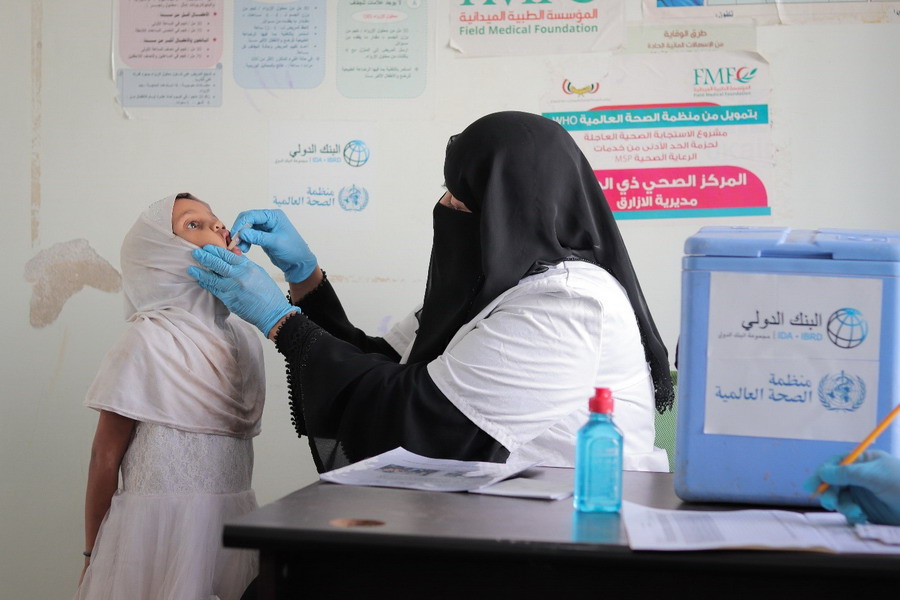
Gomea Thabit, 25 years, lives in an internally displaced persons camp in Al Azareq district, where she has settled with her family after having fled the violence in Al Hudaydah governorate.
"I took the vaccines with my children. I advise all parents to receive the vaccine to protect themselves and their children from the disease," she said.
The Yemen Emergency Health and Nutrition Project aims to strengthen basic health and essential nutrition and water, sanitation and hygiene services. It also aims to support and preserve the national implementation capacity by investing in the existing, local structure in the health and water and sanitation sectors, which will help maintain the main foundations for a speedy recovery in the post-conflict phase in the future.
Yemen Emergency Health and Nutrition Project
With the support of USAID, WHO and INTERSOS provide urgent medical care in Lahj governorate
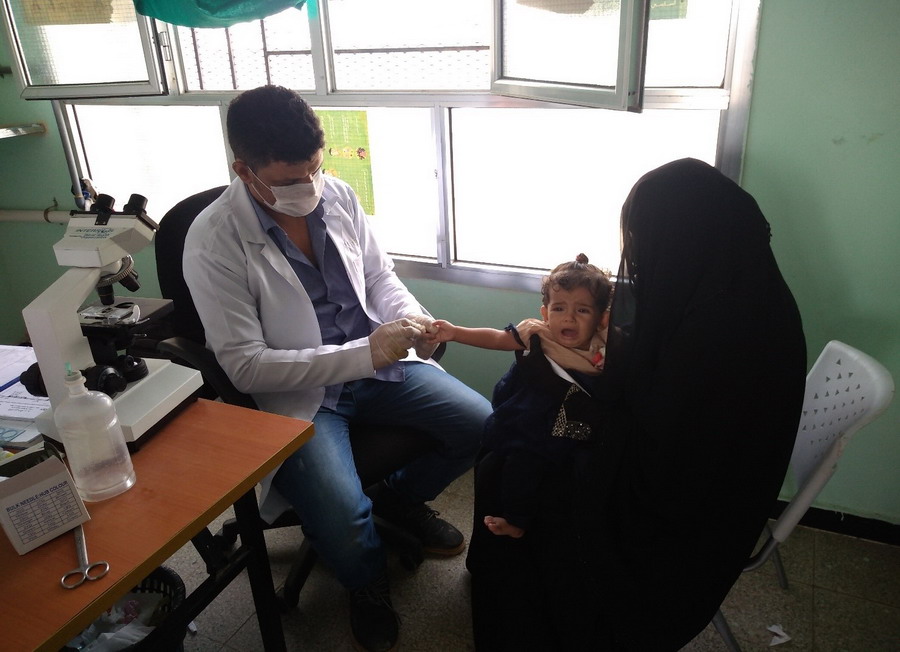
With the support of USAID, WHO and INTERSOS have been working together to provide urgent assistance to the population in need of primary and secondary health and nutrition services in Lahj governorate.
15 March 2021 – Driven by years of conflict, the human-made crisis in Yemen has resulted in a near collapse of an already fragile public infrastructure, further exacerbating the population’s humanitarian needs with each year of the conflict.
Health services are not an exception as nearly 17.9 million people needed health care services in 2020, and the situation is not expected to improve in 2021.
At the same time, the health system has been devastated, with only half of the health facilities fully or partially functioning and still lacking basic requirements such as fuel, water, essential medical supplies, and qualified health staff.
With the support of USAID, the World Health Organization (WHO) and INTERSOS have been working together since January 2020 to provide urgent assistance to the population in need of primary and secondary health and nutrition services. The joint project included supporting 11 health facilities across the districts of Tuban, Radfan, Al-Milah, Al-Maqatira and Al-Mudaraba wa Al-Ara in Lahj governorate and reinforcing outreach and referral mechanisms with a network of community health volunteers.
Doa’a, a 30-year-old woman from Al-Milah district, was grazing sheep when she stumbled and fell on a sharp rusty iron bar. She was rushed to Dar Shiban Health (Al-Milah district) for emergency care. “We received Doa’a in bad condition, but the treatment was provided timely to prevent secondary infection. She was kept under observation for one week until she recovered,” said Abdulmontaser Moqbal, a medical doctor at the centre.
The partnership also aims at reducing morbidity and mortality of the most vulnerable conflict-affected populations. It focuses on children under 5 and pregnant and lactating women in the targeted districts by providing trauma emergency and surgical services and primary health services, including outpatient consultations, immunization, and basic clinical management.
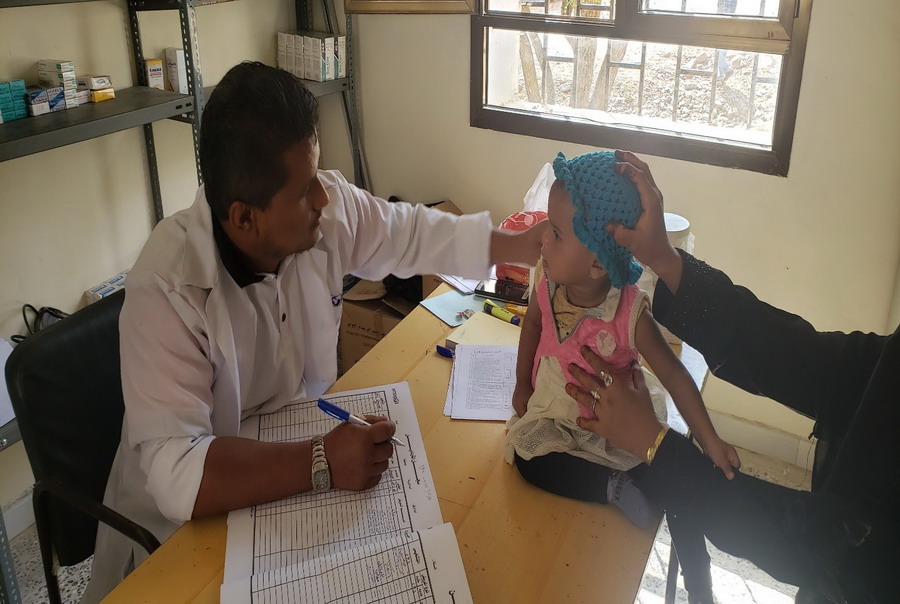 The partnership aims to reduce morbidity and mortality among the most vulnerable conflict-affected populations focusing on children under 5 and pregnant and lactating women in targeted districts
The partnership aims to reduce morbidity and mortality among the most vulnerable conflict-affected populations focusing on children under 5 and pregnant and lactating women in targeted districts
Marwan, a 7-year-old boy from Al-Milah district, was admitted to Dar Shiban health centre because of high fever, chest pain, respiratory difficulties, and severe nausea. The medical team identified a chest infection and provided the needed medication, including antibiotics, oxygen support, and intravenous fluids until Marwan’s condition stabilized. Following discharge, he was put under follow up visits until his full recovery.
Abdullah, a 35-year-old man from Tuban district, had an accident with his motorbike. When he was brought to the health unit at Dar Al-Manasrah health unit, he suffered from an arm fracture and multiple wounds. “The pain I felt because of the fracture was unbearable, but the medication provided by the medical assistant relieved the pain,” said Abdullah.
“Having access to health services is a luxury in our conflict-affected country. We thank the humanitarian organizations that provided health services and essential medication,” Abdullah concluded.
Emergency response in Yemen: WHO and the Government of Japan's fight against high-threat infectious pathogens
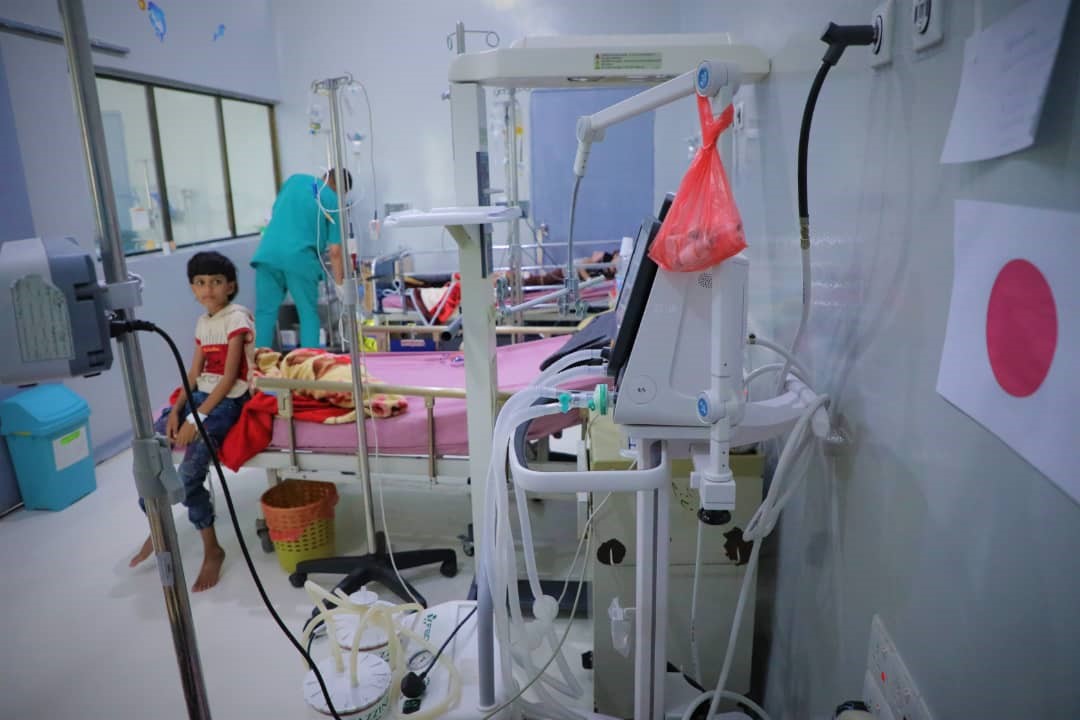 Thanks to support from the Government of Japan, WHO has supported 20 diphtheria treatment centres in Yemen, including at As Sabeen Hospital in Sana'a
Thanks to support from the Government of Japan, WHO has supported 20 diphtheria treatment centres in Yemen, including at As Sabeen Hospital in Sana'a
28 February 2021 – The humanitarian emergency in Yemen has forced the health situation into a critical state. The ongoing conflict in several areas of the country has negatively impacted the functioning of health facilities as medical staff have fled the country or became displaced. Since 2015, health workers have not regularly received their salaries.
The COVID-19 pandemic has exacerbated the situation, further complicating the population's access to health care services at a time when the need for health care is critical.
At the same time, several high-threat infectious pathogens continue to be endemic in Yemen, posing public health threats to the population. Data from 2020 show that cholera, dengue, and diphtheria were the top 3 diseases aside from COVID-19, resulting in significant morbidity and mortality among the population.
In March 2020, the World Health Organization and the Government of Japan joined forces to strengthen the emergency response to meet the needs of the most vulnerable populations in Yemen. With the generous US$ 363 636 contribution from the Government of Japan, WHO has been able to implement a comprehensive disease prevention and control programme to combat high-threat infectious pathogens in the country.
Within the project timeframe, WHO provided life-saving medications to the population affected by diphtheria, including internally displaced communities and host communities. A total of 24 309 diphtheria patients and their contacts across Yemen were reached with essential diphtheria medication. Twenty health facilities were supported with diphtheria medication to ensure essential medication for vulnerable people.
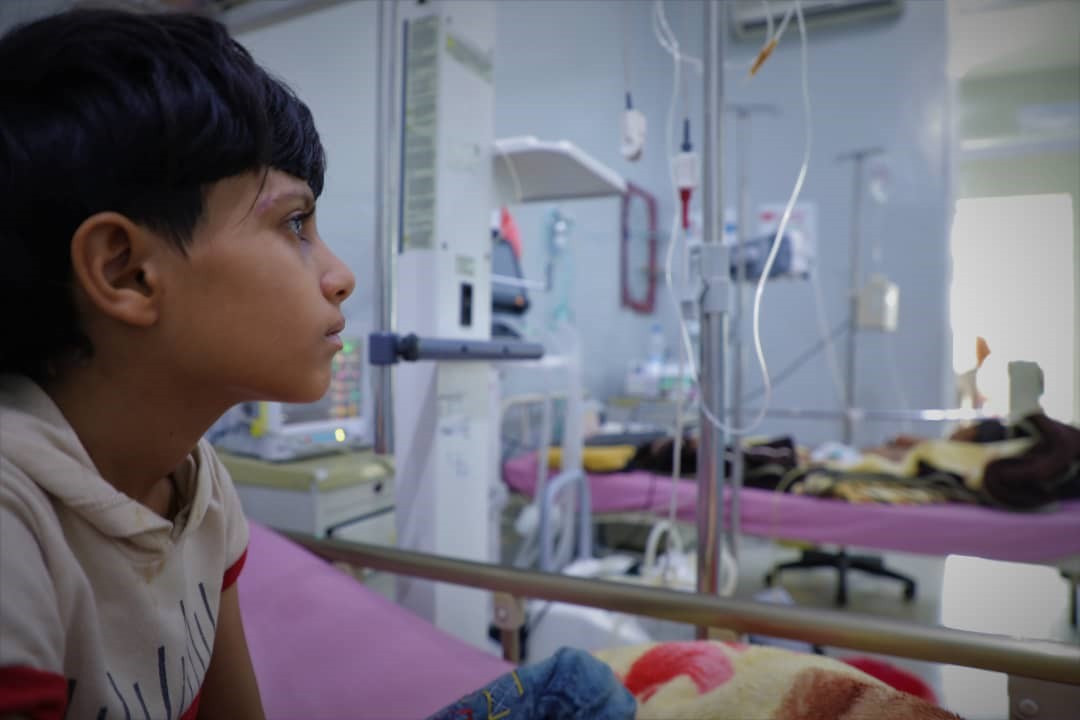 After 10 days of treatment at the diphteria treatment centre in As Sabeen Hospital supported by WHO and the Government of Japan, Mohamed is ready to be discharched
After 10 days of treatment at the diphteria treatment centre in As Sabeen Hospital supported by WHO and the Government of Japan, Mohamed is ready to be discharched
After 10 days of treatment at the diphteria treatment centre in As Sabeen Hospital supported by WHO and the Government of Japan, Mohamed is ready to be discharched.
To prevent mosquito-to-human transmission and improve care for dengue patients, WHO supported health authorities in conducting 6 fogging and spraying campaigns in 7 districts in the governorates of Abyan, Shabwa, and Taizz, protecting 814 000 people, including 90 000 internally displaced persons. WHO also facilitated the training of 63 health workers on dengue case management and 60 community leaders on community prevention. The support contributed to a significant reduction in the areas most affected by dengue.
The project also supported a field epidemiology training programme, a 6-month training course for 54 fellows on basic field epidemiology and outbreak investigation. This intensive capacity-building programme strengthened the field epidemiology skills of district surveillance coordinators working in the most outbreak-affected governorates, enabling them to better respond to epidemic-prone diseases.
WHO and the Ministry of Public Health and Population will build on the successes achieved through this project in protecting health security in Yemen. It is envisioned that the field epidemiology training programme's capacity strengthening will be utilized immediately, especially amid the ongoing COVID-19 pandemic. The communities that have been empowered to prevent dengue and the health care workers that have learned to provide quality medical care to dengue patients will continue to apply the knowledge and skills they gained through the training provided through this project.
"The generous support from the people of Japan enabled WHO to help health authorities meet the most urgent health needs of people affected by diphtheria, as well as capacity-building needs for public health responders who are working tirelessly in Yemen. On behalf of all people in Yemen, WHO expresses sincere appreciation to the people of Japan for extending their support," said Dr Adham Ismail, WHO representative in Yemen.
The Government of Japan has played a critical role in supporting WHO's humanitarian response in Yemen, donating more than US$ 11.2 million between 2015 and 2019. In July 2020, Japan contributed US$ 3 million to support mental health care across Yemen, where hundreds of thousands have been impacted by psychosocial stressors caused by war, hardship, illness, and family separation.


